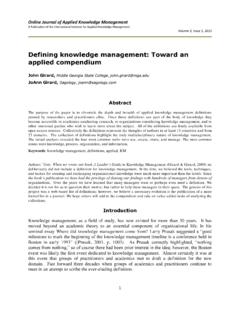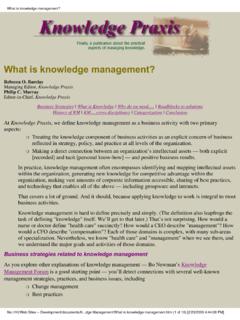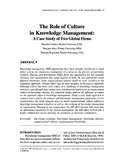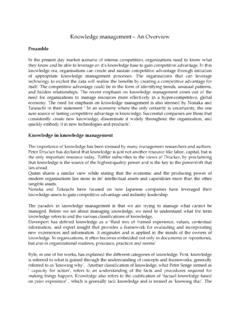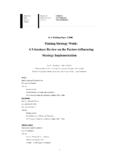Transcription of STRATEGY AND STRATEGIC MANAGEMENT CONCEPTS: ARE …
1 Business Administration and Management43 DOI: , XVII, 2014 IntroductionWhen reviewing STRATEGIC thinking, we realizehow this phenomenon has gone through differentphases and semantic contexts. With a millen-nium distancing the word from its origins, theword STRATEGY has had several meanings butwithout ever losing its semantic roots. In thebeginning, STRATEGY took on a militarysignificance and represented the action ofcommanding or leading armies in times of war, a military campaign [30]. It meant a way ofprevailing over the adversary, a tool of victory inwar and only afterwards was it applied to othercontexts and fields of human relationships:political, economics, business, among others,but always retaining in all its uses the semanticroot, to define paths [76].
2 After several phases and meanings, theconcept of STRATEGY has evolved into a field ofknowledge in MANAGEMENT , STRATEGIC mana-gement, with content, concepts and practicalreasoning, ending up by carving out its ownrole in the academic and business fields [25]. MANAGEMENT uses this old military concept toassociate the activities of a general with thoseof an organization s manager [76]. Since itrepresents an important tool for businessmanagement in a competitive and turbulentmarketplace, the main objective of strategyinvolves preparing the organization to confrontthe current hostile environment, to this endsystematically and objectively deploying theskills, qualifications and internal resources ofthe enterprise [25].
3 On the other hand, theconcept of STRATEGY still seems to be a veryvague concept and subject to variousinterpretations [14].An exact definition of STRATEGY may notactually be fundamental, however, within thecontext of organizational knowledge MANAGEMENT ,specifically the knowledge that newprofessionals bring into companies, graspingwhich type of STRATEGIC understanding newmanagers bring into the organization is clearlyof importance [15], [58], [74]. Thus, we mayquestion whether concepts of STRATEGY andstrategic MANAGEMENT are understood bybusiness managers, especially the younger, thenewly graduated in MANAGEMENT .
4 Therefore,this research aims to assess the acquiredknowledge of university MANAGEMENT studentsrelating to STRATEGY and STRATEGIC managementconcepts with the purpose of answering thefollowing question: What is STRATEGY andstrategic MANAGEMENT to future managers? Arethey understood and recognized?To answer this question, this study seeks toexamine MANAGEMENT student understandingas to the meaning of these two concepts. Asspecific objectives, we seek : (i) to buildamodel explaining the definition of strategyaccording to the perceptions of studentsgraduating in MANAGEMENT , and (ii) to identifywhich concept of STRATEGIC MANAGEMENT in theexisting literature comes closest to theperceptions of current MANAGEMENT understand the perceptions of indivi-duals about a particular concept , we adoptphenomenography type research main feature of the research method is itsdescription of a phenomenon as it is expe-rienced, emphasizing the collective significanceof the studied phenomena, and should in noway be confused with phenomenologicalstudies.
5 Phenomenology is far more concernedwith the individual experience of the peopleinvolved than with the phenomena studied [2].The study is justified due to the sheerimportance of the themes of STRATEGY andSTRATEGY AND STRATEGIC MANAGEMENTCONCEPTS: ARE THEY RECOGNISED BYMANAGEMENT STUDENTS?Emerson Wagner Mainardes, Jo oJ. Ferreira, M rio L. RaposoEM_01_14_zlom 8:44 Str nka 43strategic MANAGEMENT to contemporaryorganizations [74]. In this sense, the surveysought to contribute towards managementknowledge in the organizational environmentby clarifying what is the real understanding ofmanagement graduates on the themes ofstrategy and STRATEGIC to Tseng [83] and Obembe [60], knowledge MANAGEMENT in an organizationbegins by identifying the knowledge thatindividuals bring in from outside the this case, the development of organizationalstrategy depends on understanding theperceptions of their managers on what strategyand STRATEGIC MANAGEMENT actually is.
6 Theidentification of perceptions of future managerson the two concepts, as used in this study,contributes significantly to organizational mana-gement practice. This enables the organization smanagement strategies as organizationalknowledge on the field of STRATEGY can hardly bemanaged should each manager understand theconcept study findings may also be expected tocontribute to Higher Education Institutions(HEI), by identifying what level of understan-ding their graduating MANAGEMENT studentsattain regarding the subjects under research contribution also extends to theacademic world by presenting the concepts ofstrategy and STRATEGIC MANAGEMENT mostpresent and active in the minds of futuremanagers, findings rarely encountered in theliterature.
7 There are few studies relating strategyas a theoretical approach and its practicalapplication in organizations [42], [68]. Thus, thisstudy contributes to research on STRATEGY demon-strating that the field of STRATEGY , comprising asit does of several concepts and approaches,generates confusion among managementpractitioners. After all, the same phenomenonis approached in several distinctly differentways and individuals working in managementwould also seem to hold various perspectives,often understanding neither the real meaning ofstrategy nor its MANAGEMENT [41], [62].Furthermore, this research aims to providesome insights for lecturers bearing in mind thatstudent opinions and knowledge on this matterreflect the efficiency and the effectiveness ofthe STRATEGY related learning process [31],potentially revealing a need to change thedidactics of these reason that led to this study wasthe method adopted, phenomenography,whose main characteristic is its ability tocapture the perceptions of a group of peopleabout a concept .
8 After an exhaustive search ofavailable scientific databases, only one study ofasimilar nature was found, the Shanahan andGerber [75] research on the concept of qualityin HEIs, which proved the inspiration for theresearch set out here. Most of the otherphenomenography studies found deal witheducational teaching methods [5], [13], [19],[36], [63], [82] or, in fewer cases, the behaviourof consumers [88]. In the field of STRATEGY , theyboth represent an innovation and a newalternative for paper is structured as follows: firstly,aliterature review of the STRATEGY and strategicmanagement concepts from a historicalperspective is carried out. Afterwards, thephenomenography research is described andexplained.
9 The methodology adopted in thesurvey is presented in the next , the collected data are analysedand our model is tested. The article ends upwith final considerations and future STRATEGY and StrategicManagement: a HistoricalPerspectiveStrategy was created by the Greeks, whoendowed the concept with a military conno-tation. The term derives from the Greek strategos,translated as a general in command of troopsor the art of the general or plan to destroyenemies through effective use of resources[18], [76], [78]. This term in itself contained theidea of objectives to be achieved and plans ofaction to be performed in various scenarios,depending on the enemy s behaviour [73].
10 According to Mintzberg and Quinn [53], STRATEGY was already considered as an orga-nizational skill at the time of Pericles (450 BC),meaning MANAGEMENT skills (administrative,leadership, public speaking, power). However,it was only after World War II that STRATEGY fullyentered into the business world, which hassince grown significantly and needed guidance,lines and paths to be followed by their entirestructures [18]. This growth increased organi-zational complexity and, together with theaccelerated pace of environmental changes,Ekonomika a management442014, XVII, 1EM_01_14_zlom 8:44 Str nka 44 Business Administration and Management451, XVII, 2014began requiring enterprises deploy greatercapacity to create and manage strategiesenabling them to meet the challenges of themarket, reaching their objectives in the short,medium and long term [25].



